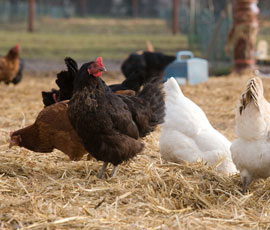Free-range systems challenged

Free-range egg production has come under fire in the national media, amid suggestions that birds kept in enriched cages have a better life than those with access to the outdoors.
According to reports in The Daily Mail and The Daily Telegraph, research by Bristol University has shown that birds in enriched cages suffer lower levels of mortality, fewer bone fractures and less feather pecking.
The newspapers were quoting Bristol University’s Prof Christine Nicol, who had been addressing a media briefing organised by the Science Media Centre on large-scale farming.
“Caged hens are more comfortable than people think, and have higher welfare as standard than free-range hens,” the Mail quoted her as saying.
Prof Nicol has subsequently made clear that the research was not actually that new and that, while mortality, bone fractures and aggressive feather pecking were lower in enriched cages than free range, they were not the only considerations.
“What I’m not saying is that enriched cages are the best option for birds. The best option is free-range systems without a doubt, but the free-range systems have to get the management right,” she told the BBC’s You and Yours programme.
“It’s not so much the size of the flocks,” she added. “It’s about the detailed management and there are very many things that can go wrong on a free-range system. And when things go wrong, they can go very wrong.”
Prof Nicol explained that many free-range producers were trying to improve welfare standards further. To help them, consumers should buy eggs with high welfare branding.
“They can’t just assume that, if they buy a basic free-range egg it’s going to be really providing what they think it is.”
The British Egg Industry Council said the most important factor in ensuring the welfare of the hens was how they were cared for, whatever production system was used.
“Good stockmanship is paramount to hens’ health and wellbeing,” said a spokesman.
“Schemes such as Freedom Food or the British Lion mark not only ensure the welfare of the hens, but also ensure that the people looking after them are trained to give the hens the best possible care and attention.”
Cannibalism hits beak trimming trial
